We are the ADA Generation
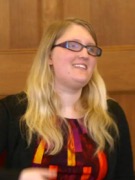
Annika
“I take exception to the whole narrative of ‘overcoming’ a disability—saying that ‘this person has a disability, but they can overcome it and be ‘normal’—because, as a person with a disability, I feel as if my experiences and challenges have shaped the career path that I want to take: helping students with disabilities be more active in college life.”
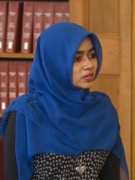
Azwirah
“We have to motivate and inspire not only the people with disabilities but also the employers to (make available) more jobs and eliminate stereotypes. By 2040 I hope we will have equality with employment and everything else, not only in the states but globally.”

Drew
“Coming into college was interesting because there’ve been some challenges I didn’t think of that surprised me. They were very helpful here to accommodate whatever my need was, but it would be nice to have someone similar to my situation to talk to about entering into college or employment—like, what to expect.”

Emily
“Each person with a disability is an individual. So I think the idea becomes ‘How do we level the playing field? How do we ensure that everyone gets the right amount of support in order to reach the same goal?’ Our education system has systemic issues that are reflective of our society’s problems. But education is becoming much more individualized, and differences are recognized and valued. If you look ahead to 2040, I see that becoming the core belief. We’re on the road there.”

Geoffrey
“It’s almost relieving to me to see that there are other people with disabilities at Drake. I see people coming and going in my visits to Michelle’s [Drake University’s disability services coordinator] office for audio books, and get to know them and say, ‘Hey, so what are you battling today? I’ve got dyslexia.’ It’s just kind of neat to see different faces on Drake’s campus that have other disabilities.”
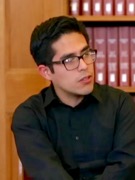
Hector
“When it comes to media representation, there needs to be a shift in focus on mental disabilities; it doesn’t only affect upper middle class white Americans. There needs to be a focus that mental disabilities affect everyone regardless of your race, ethnicity, or gender. I appreciate the opportunity to hear about the disability community and discuss the different issues that we can all work together and address in the future.”
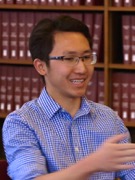
Larry (Zi Jian)
“Employers play a very, very important role by showing that they do embrace (people with disabilities). Whenever I look at employers, I always look [to see] if they have equal opportunities. Do they offer equal opportunities for people with different races, religions, nationality, and abilities? Not just saying that they offer equal opportunity but also embracing and actually letting other people know that they do practice it so that other people can see.”

Michelle
“I think once the idea of ‘normal’ has been thrown far into the ocean and people realize that you may have a disability—it could be physical, it could be emotional, it could be mental—you see the world differently and bring a different viewpoint than someone else. It’s an asset. The ADA is still young; it’s still developing. I think that we’re the first generation of people to have the ability to view ourselves as no different than the other person on the street.”

Nadia
“I learned that on college campuses we embrace stigmas, but then we also use terms very loosely. I’ll hear a kid say, ‘I’m so OCD. My room has to be cleaned all the time.’ ‘I’m so depressed. So-and-so died on Scandal.’ Like, we normalized it to the point that when there’s someone who actually does have a condition, we’re like, ‘Oh, you’re being overdramatic.’ It’s kind of a double-edged sword.”
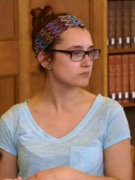
Tori
“I had my brain injury in high school. I am now visually disabled, physically disabled, and my hearing is impaired. When that happened, after the brain injury, my parents didn’t really have any idea what to do. I knew these things were happening to my body. We had to do the majority of the legwork ourselves and sought out teachers at my high school to see about how they could accommodate me because the ADA does demand those information rights for people with disabilities. It would have been nice to have that information available to my parents so we didn’t have to hunt it down.”

Zach
“Your disability is no different than your hair color or your eye color. It’s a part of you. It does affect your life in a way; it makes you who you are. But you don’t have to feel victimized by it. People with disabilities can live happy lives and feel important and successful and accomplish many great things if they just believe it. I want people that interact with people with disabilities to know that, too—that these are valid people with so many great talents, so many great triumphs, so many great failures, because we all fail and we all triumph. I want people to start seeing people with disabilities on the same level.”

What do you think?
There are millions of members of the ADA Generation. Help us tap into their wealth of experiences and ideas by launching a worldwide conversation at #ADA30. Together we can do more to ensure people with disabilities in 2040 have equal access and opportunities in their workplaces and in their communities. But we need your voice.
Join the conversation today
Address: 2800 University Avenue, Des Moines, IA 50311
Phone: (515) 271-3623
Email: harkininstitute@drake.edu
Office Hours: Monday to Friday 9:00 a.m. to 4:00 p.m.



